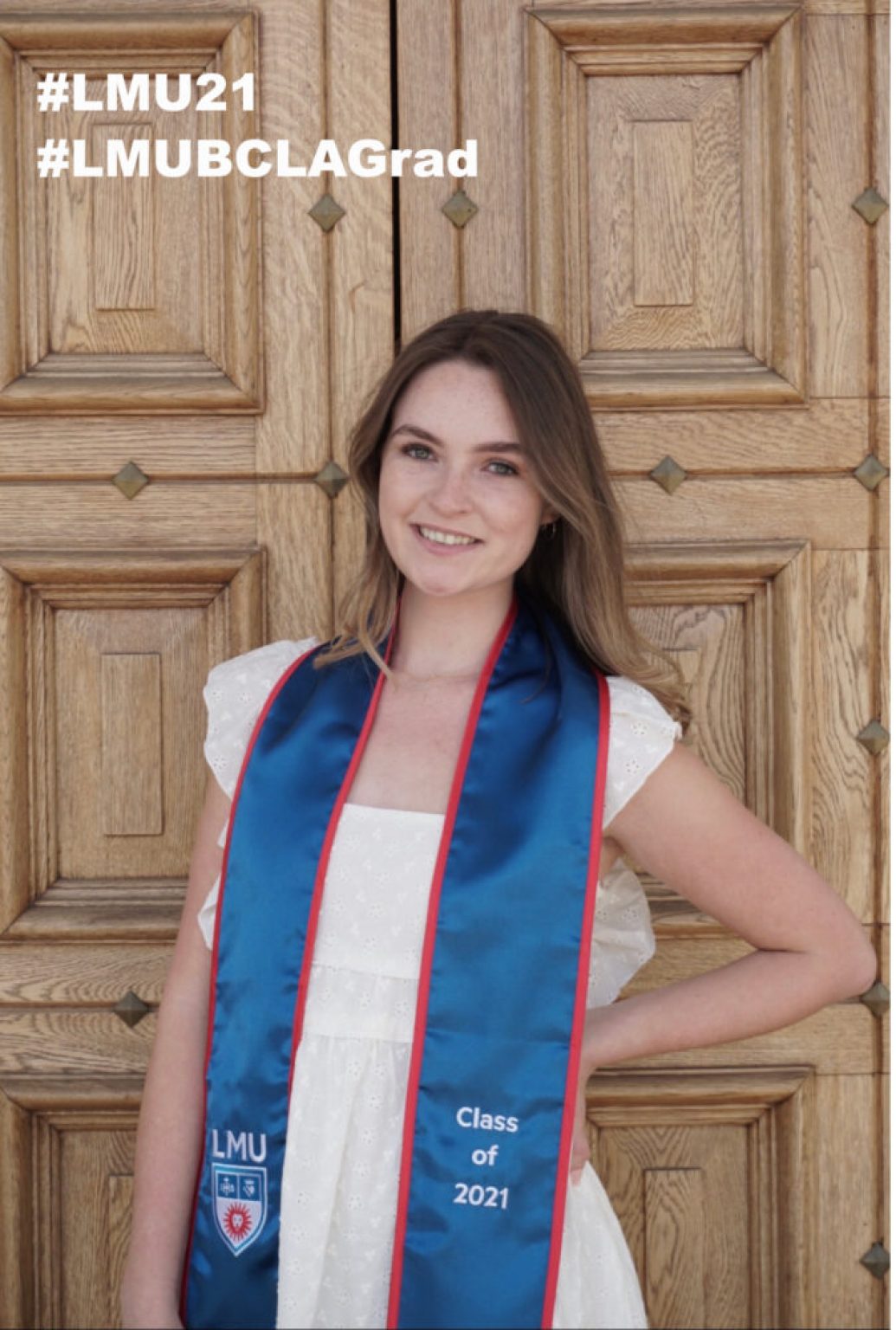
Siobhan Collins ’21
Majors: Political Science, Economics
Next Step: Analyst at Cornerstone Research
Love at first sight may be a cliché, but it seemed to be true for Siobhan Collins—at least when it came to selecting a college. “I went to a Jesuit high school and I really wanted to continue my education at a Jesuit University. During my senior year of high school, I visited LMU and fell in love! I completed an overnight stay with a few freshmen and attended some classes as well. I immediately felt comfortable and could imagine myself living there for the next four years,” says Collins, who is graduating as an economics and political science double major.
Collin’s academic journey is in many ways emblematic of the exploration and discovery that undergird a liberal arts education. She entered LMU as a political science major, but could not shake the feeling that she wanted something else to compliment her political science classes. So, Collins took advantage of LMU’s core curriculum and explored her diverse interests including astronomy, piano, math, history, and French. In doing so, she realized that she wanted more quantitative courses, which drove her to declare a second major in economics. In addition, she added a philosophy minor because of how much she loved her introductory philosophy class. Looking back on her academic experience, Collins says, “My courses at LMU have been so diverse and I have truly enjoyed getting to take courses in so many disciplines. It is a really cool feeling to be able to make connections across disciplines and in seemingly very different courses.”
Outside of her studies, Collins has been a part of several academic and extracurricular experiences. She was admitted to the LMU Honors Program, and belongs to four different honors societies on campus: Pi Sigma Alpha, the Political Science Honors Society; Omicron Delta Epsilon, the Economics Honors Society; Alpha Sigma Nu, the Jesuit Honors Society; and Phi Beta Kappa, a prestigious National Honors Society. Collins is honored to be a part of these organizations which recognize her commitment to a broad, liberal arts education.
Collins also explored service and social justice opportunities. “I have really appreciated all of the service experiences I have had and the entrée into different social justice issues,” she says, “My eyes have been opened to a world outside of my own bubble during my time here.” Her journey has included two Alternative Break (AB) trips: the AB California Prisons trip and AB Tucson trip. The first explored mass incarceration and the prison-industrial complex through visits to jails, prisons, and NGOs throughout California; while the second examined pressing immigration concerns through a visit to a detention center, a viewing of Operation Streamline proceedings (which targets migrants apprehended at the border for accelerated prosecution on charges of illegal entry), and a water drop in the desert. These trips were transformative for Collins, and helped instill in her a passion for social justice.
Collins has pursued this passion through further education and research on mass incarceration and the school-to-prison pipeline. She worked with Professor Brad Stone of the Philosophy Department to conduct research on the implementation of metal detectors in schools and school securitization efforts. Professor Stone has been a research mentor for her since freshman year, and his guidance was essential in developing the project. Collins completed two Summer Undergraduate Research Programs around this project, and was able to continue her research with a research grant from the Honors Program. Under the mentorship of Political Science Professor Andrew Dilts, Collins incorporated that research into her Honors thesis—a theoretical analysis of the implementation of metal detectors in the Chicago Public Schools that she presented at the Western Political Science Association Conference. Professor Dilts helped Collins through the process of writing her Honors thesis, and she feels grateful to him for meeting with her every week during the past year, and supporting her personally and academically through these difficult times.
Collins has also been the team captain and treasurer of the LMU Mock Trial team for the past three years; interned as a law clerk at the Cook County State Attorney’s Office; interned as a legal intern with Loyola Law School’s Youth Justice Education Clinic; and worked as a quality assurance representative for LMU Facilities Management. As a student worker, she has gained a deep understanding of campus, and praises her supervisors, Brittnee Wadlington and Eric Chavoya, as “the best bosses that I could have ever asked for.”
After graduating, Collins will be be joining Cornerstone Research as an Analyst in their Chicago offices. Cornerstone is an economic and financial consulting firm that provides analysis through all stages of commercial litigation and regulatory proceedings, and Collins is excited to join their team and apply the skills she has developed at LMU. Eventually, Collins plans to attend graduate school, but has not yet decided whether to go to law school, or pursue a Ph.D. in economics or political theory. However, no matter where her path may lead, Collins is certain about one thing: “I want to be in a career where I can continue to learn new things everyday and do something that I am passionate about.”
Looking back, Collins says that she most appreciates LMU’s focus on Cura Personalis, the care of the whole person: “I have felt so cared for during my time at LMU. Whether from my friends, professors, or strangers, I have found LMU to be a community where people care deeply about each other. I have also met so many passionate people. Everyone I have met at LMU has something that they are very passionate about, whether it is their service, their research, their classes, or their club.” She encourages her fellow BCLA students to take advantage of the school’s many opportunities to pursue their respective passions, and—above all—to enjoy their time as students at LMU.



